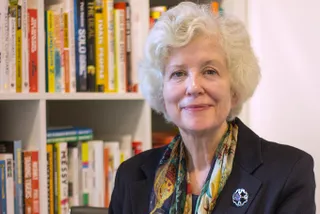
The Taliban, Diplomacy and the Importance of Tea| A Q&A with Claire Smith
Claire is the only female diplomat to have negotiated with the Taliban, she has worked in China, Pakistan, Germany and Switzerland and has even found herself on a North Korean stamp, and yet when we sat down with her at Speakers Corner, she’s still describes herself as an ‘eternal student’.
During an extraordinarily unconventional career in diplomacy, intelligence and security, and business, work with the UK government, Cabinet office, the German Foreign Ministry and a Major Swiss bank, Claire is stepping into her role as a keynote speaker and teaching us the importance of crisis management, communication under pressure, and how a good cup of tea can save a negotiation.
Can you provide a glimpse into the contrasting cultures you experienced during your long career with the Foreign and Commonwealth Office?
Culture is the product of many elements. In the international world, history, political systems, language, alliances, wars all contribute. The clearest example in my life and work of different political systems would be divided Germany after 1945: hard to imagine for those born after the fall of the Berlin Wall just how the two parts differed.
Organisational cultures are strange beasts. Key individuals can make or break them. Ambassadors, especially in tough posts, really do set the tone from the top.
China in the early 1980s was an extraordinary place. Modernisation, economic reform and resumed contact with the wider world generated a mixture of enthusiasm, caution, curiosity, nervousness, energy and uncertainty.
You've negotiated with The Taliban, alongside a number of other high-pressure diplomatic situations. What skills did you take from those experiences that you now pass onto businesses?
Learn your craft. Walking into a crisis as an inexperienced newcomer and emerging as a hero is for the movies. Practice, observe, watch, learn, listen. After every crisis, have an honest wash-up exercise.
Give your team members opportunities, but support, accompany, train.
Don’t assume. How will you achieve your objectives in this situation, this setting, this context?
Transactional or relationship-based? Is the present deal all that matters?
We discussed having a cup of tea as a great metaphor for diplomatic conversations. From a communication perspective, what did you learn from those meetings?
Tea cultures are very helpful. They offer structure and usually are very much part of The Way We Do Things Around Here. You can establish rapport by observing the local tea customs.
Drinking tea gives you time to think, listen, assess, reflect as you sip.
Take time to observe, assess, listen. Don’t be afraid of silences or gaps in the conversation.
Check your understanding and allow your interlocutors time to do the same.
You cited yourself as an eternal student and that “There’s no point living in the past. You can’t live on what you did. You’ve got to keep going and use it as a springboard for what’s next.” How do you believe that attitude has added to your career?
Leaving a bureaucracy and finding my own way in the world generated much reflection and re-invention. I had thought most people enjoyed unusual, quirky, demanding situations and a regular change of location, but I was wrong. However, I decided that no experience is ever wasted, but can be used as a building block for something new. I have doubtless taken several detours along the way, but you have to accept responsibility for your decisions. And has been wisely observed, life has no re-wind button. Living in the past is not going to appeal to organisations solving today’s problems.
And of course, since leaving the Diplomatic Service you’ve gone onto set up your own company and work in a variety of cultures. What’s it been like working in the private sector?
I have in fact had a mixture of roles: voluntary, in school governance; a member of a government appeals panel; an NED in an employee-owned business; a visiting speaker at universities. It has not been total and exclusive immersion in the private sector.
I obtained two post-graduate qualifications to improve my knowledge; one in business administration, and a Masters in Major Programme Management. I wanted to show I was serious about my new direction, was prepared to obtain the necessary skills and have that knowledge validated by a serious university.
I have very healthy respect for cash flow.
If there was one message you could leave your audience with, what would it be?
Don’t assume.
And finally Claire, you've got a stamp in North Korea with your face on it, can you tell us how that happened?
A former colleague told me that North Korea had issued a stamp depicting the signing ceremony for the Hong Kong Agreement. Tucked away in the top left- hand corner of the photograph is a younger version of me. I was serving my own apprenticeship at the time as a junior member of the UK delegation. Why North Korea issued these stamps, I do not know, but thanks to a thoughtful friend, I now have a complete set.
For further information call us on or email info@speakerscorner.co.uk .
Newsletter Sign Up
If you liked this article then why not sign up to our newsletters? We promise to send interesting and useful interviews, tips and blogs, plus free event invites too.
Have an enquiry?
Send us a message online and we'll respond within the hour during business hours. Alternatively, please call us our friendly team of experts on +44 (0) 20 7607 7070.
